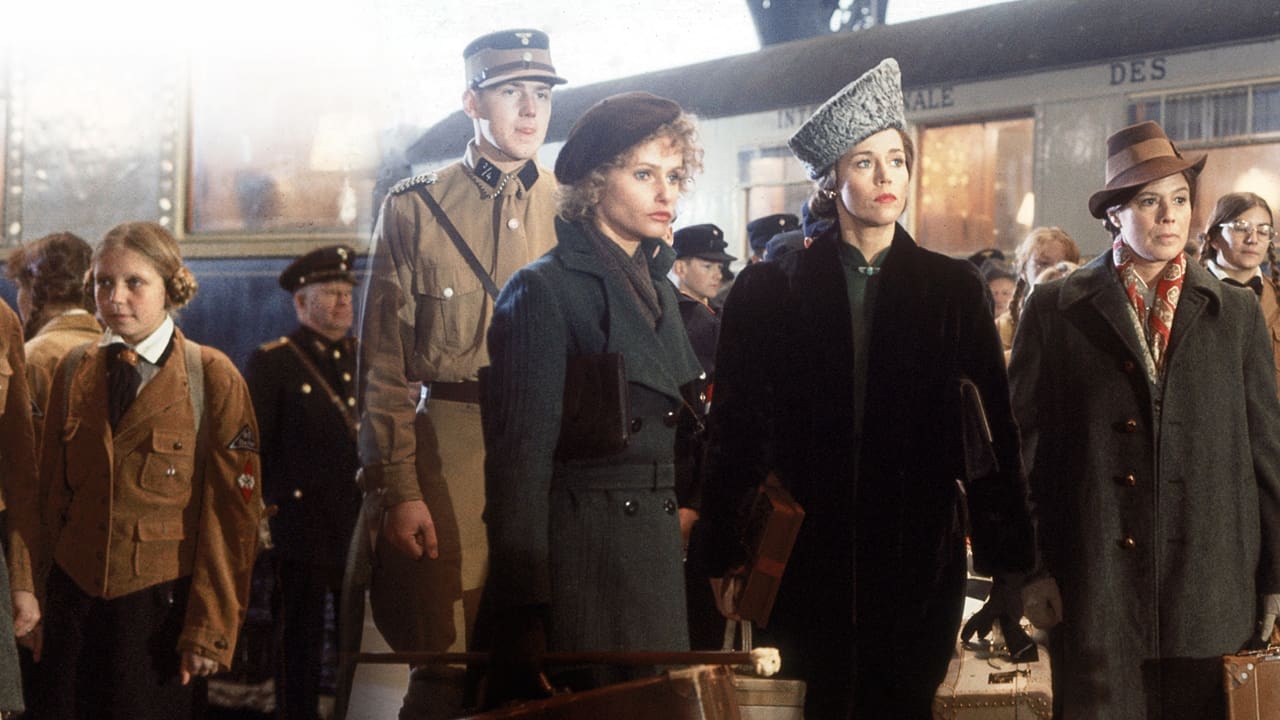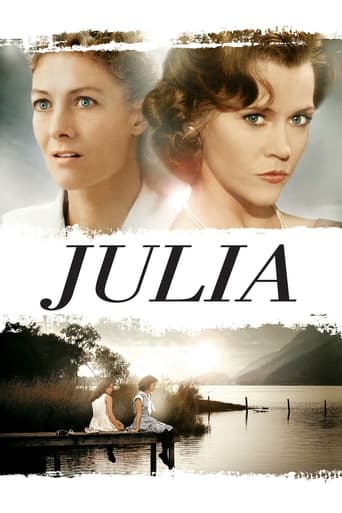Tedfoldol
everything you have heard about this movie is true.
Huievest
Instead, you get a movie that's enjoyable enough, but leaves you feeling like it could have been much, much more.
Melanie Bouvet
The movie's not perfect, but it sticks the landing of its message. It was engaging - thrilling at times - and I personally thought it was a great time.
Calum Hutton
It's a good bad... and worth a popcorn matinée. While it's easy to lament what could have been...
HotToastyRag
Jane Fonda stars as Lillian Hellman and Vanessa Redgrave stars as her friend, the title character, in Julia. The two women grow up together but take separate paths in adulthood. Lillian bonds with Dashiell Hammett, played by Jason Robards, and becomes a writer, and Julia goes to Oxford. In the years before WWII, Julia stands up to Nazis and gets punished for it, and when Lillian rushes to her to help, she finds herself involved in a dangerous and secret mission.While Jane is always very likable and easy to root for, her costar feels washed-out by comparison. Vanessa can't stand up to Jane's energy, and her performance is easily forgettable, even though she won an Academy Award for it. Jason Robards, also naturally grumpy and unlikable, also won an Oscar for his performance.I didn't end up liking this movie, and since there are hundreds of pre-WWII, anti-Nazi movies out there, I wouldn't really recommend watching this one unless you're a die-hard Vanessa Redgrave fan. I'm not, so I don't tend to enjoy her movies.
SnoopyStyle
It's 1934. Lillian (Jane Fonda) is struggling to write her play while living with her mentor lover Dashiell Hammett (Jason Robards). It's a fiery relationship but her closest relationship is Julia (Vanessa Redgrave). They were brought up together in Julia's grandparents' palatial mansion. Julia became a social activist battling the rising tide of fascism in Europe. She was beaten in Vienna, hospitalized, and escaped. Lillian returns from Vienna to write a celebrated play. She visits Paris where Lillian sends Johann (Maximilian Schell) to meet her. Despite her Jewish background, she is recruited to bring Julia's money to Berlin to bribe for her colleague's freedom.These are great actresses. The movie spends too much time with Lillian's relationship to Dashiell and her writer's block. They end up adding very little to what is truly needed for this story. This movie needs to develop her relationship with Julia. Julia is the titular character and the more fascinating one. Meryl Streep has an early minor role but it's really insignificant. It takes awhile for the movie to get interesting. It's a slow start and the women don't get consistent time together until late in the movie.
Scott-344
"Julia" holds a special place in my heart. It was one of the first times I read a screenplay before seeing the film and was completely enthralled -- in suspense and moved to tears. Notice how characterization drives the slowly building suspense culminating in a fantastic third act devoid of pyrotechnics or gimmicks. (Never mind that the story is almost 100% fiction; this is adaptation at its finest.)A well-deserved Oscar-winner for Alvin Sargent, the script belongs on any screen writing student's bookshelf alongside "Chinatown" and "Ordinary People" two other Oscar-winners from the era. Confession - by "era" I mean from my USC screen writing class, where I also read terrific scripts like "Marathon Man" (the Hoffman-Devane-Keller lunch scene a textbook example of "reversal" writing), "Breaking Away" and "Cutter's Way."
James Hitchcock
The late Lillian Hellmann may have been a gifted writer, but it has often been alleged that her purported biography "Pentimento" is her most complete work of imaginative fiction; Mary McCarthy famously said of her that "Every word she writes is a lie, including 'and' and 'the' ". "Julia", based on a chapter of that book, was marketed as a true story, but it has been claimed that it is pure fiction and that Hellman's supposed close friend Julia never actually existed. The film tells the story of Hellmann's alleged relationship with Julia from their childhood in the early twentieth century up until the 1930s. Julia is said to be the daughter of a wealthy American family. After studying at Oxford and the University of Vienna she becomes involved with radical left-wing politics and rejects her family's bourgeois attitudes. The catalyst for her political conversion is said to be the shelling of the working-class districts of Vienna in 1934, although the film, possibly deliberately, conflates three separate events, the Austrian Civil War of 1934, the unsuccessful attempt by the Austrian Nazis to overthrow the Austro-Fascist Dollfuss regime later the same year and the successful Nazi Anschluss of 1938. The idea that one could simultaneously be a Fascist and an opponent of Nazism (as Dollfuss and his successor Schuschnigg undoubtedly were) is probably too complex for the film's rather simplified political view; much easier to blame the assault on the Viennese working class on Hitler. The script also omits the fact that Hellmann was a committed communist and admirer of Stalin; in the film her politics are simply anti-Nazi. Hellmann is by now a successful playwright, so celebrated that people even recognise her "when she goes out to buy mayonnaise". (An in-joke and possibly a disguised piece of product placement, playing on the well-known brand Hellman's Mayonnaise). When she is invited to a writers' conference in Moscow she is contacted by her old friend Julia, now a member of an anti-Nazi movement in Germany, who asks her to smuggle money into the country for the benefit of the cause. Despite the dangers involved in her mission, Hellmann does not hesitate to accept. Does it matter whether the story is truth or fiction? One who thought it did was the director, Fred Zinnemann, who accepted his assignment in the belief that he was directing a true story and who implied that he would have made it in a different way had he believed it to be fiction. Of Hellmann himself he said that she was a "phony character" and that their relationship "ended in pure hatred". My own view is that the factual accuracy of the story it tells is not always the most important thing about a film; there are, after all, plenty of good films, even great ones, which have played fast-and-loose with historical fact. "Amadeus" (to take only one example) is a wonderfully imaginative film, but I would not recommend it to anyone looking for an accurate account of the lives of Mozart and Salieri. Julia, however, has its faults even when seen as a piece of film-making rather than a piece of historical biography. The "smuggling money into Germany" plot sounds like something from a thriller, but seen as a thriller the film is too slow-moving and lacking in tension; it would have needed someone like Hitchcock to make it exciting. As a statement about Nazism, it does not analyse the nature of Nazi tyranny in any depth. As a study of friendship it is too one-sided. It may be entitled "Julia" but it should have been called "Lillian" as there is far more emphasis on Hellmann than on her friend. Vanessa Redgrave, who plays the ostensible title role, was only nominated for a "Best Supporting Actress" Oscar (she won) whereas Jane Fonda who plays Hellmann was nominated for "Best Actress" (she lost, to Diane Keaton in "Annie Hall"). Jason Robards, who plays Hellmann's lover Dashiell Hammett, won "Best Supporting Actor". In her controversial Oscar acceptance speech (controversial because of certain remarks she made about Zionism), Redgrave said that in this film she and her close friend Fonda had done "the best work of our lives". Fonda is certainly good, if one can overlook the fact that she looks nothing like the real Lillian Hellmann, even if this is not in my view her best film. I felt, however, that there was nothing particularly out of the ordinary about Redgrave's performance, although I will suspend my comments on the justice or otherwise of her Oscar win until I am more familiar with the performances of the other actresses who were in contention in 1977. As for Robards, I can think of at least one actor (Alec Guinness in "Star Wars") who was more deserving of the "Best Supporting Actor" award. One thing that did impress me was the quality of the photography; there are some wonderfully evocative scenes, such as the one of Hellmann fishing from a boat on a lake which opens and closes the film, the shots of Hellmann and Hammett on the beach by their seaside home on Cape Cod, and all those trains arriving at a station in a cloud of steam or puffing through a wintry landscape. Overall, however, I feel that, despite all its Oscar nominations, "Julia" must rank as a minor example of Zinnemann's work, especially as he was responsible for such masterpieces as "High Noon", "From Here to Eternity", "The Nun's Story" and "A Man for All Seasons". 5/10

